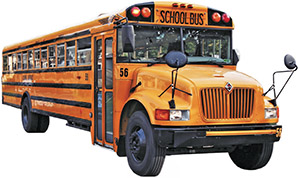
The wheels on the bus go round and round. But what happens if those wheels are steered in the wrong direction, or if one of those wheels stops working when bringing children to or from school? After a bus transporting children to Yavneh Academy in Paramus took the wrong route last month, leaving parents anxiously awaiting children who did not come home on time, Yavneh decided to create a task force to improve bus transportation processes and communication between the school, parents, bus drivers and bus companies, so that accidents or mistakes can be communicated quickly and efficiently.
“The incident raised awareness and concern; it motivated us to look at what we are doing and what we want to do,” said Rabbi Jonathan Knapp, Head of School. “We had a meeting to take short-term, intermediate measures. We opened the box and decided to examine the whole issue.”
The first preliminary meeting of the task force, co-chaired by parents Robin Tare and Keri Chachkes, took place on October 15. The first full task force meeting will be held in November, and will include parent volunteers and school administrators.
In an email interview, the co-chairs explained what they want to accomplish: “Internally, we want to review the best practices that the school can adopt in order to communicate with parents and keep our students safe. Externally, we want to have increased communication with the bus companies and boards of education. While many bus safety issues are solely under the control of the bus companies, Yavneh wants to do everything we can to ensure that our students get home safely. This is why it is so important for us to have liaisons with the bus companies and boards of education, so that we can successfully communicate these needs.”
The co-chairs said that while the group structure is still in formation, they will likely form sub-committees dedicated to different areas, including school dismissal policy and procedure, exploring technology such as various GPS-based apps that bus companies can adopt so that parents can track the bus, and having liaisons to the boards of education from the communities where students reside. Yavneh has public school buses coming from Teaneck, Englewood, New Milford, Fair Lawn and Ramapo.
Technology is helping The Moriah School, in Englewood, stay on top of communication with parents about buses. Erik Kessler, Director of Operations, said they use the One Call Now system for emergency text messaging and phone calls, as well as emergency alerts through their mobile app. “If there is a problem with a bus, we are able to text or call the parents immediately,” Kessler said. “With the mobile app, we can send updates, like ‘back in 10 minutes.’” Kessler said all bus drivers have background checks and security verification. Moriah approves drivers based on parameters developed with the bus companies.
School buses are managed by the Boards of Education where students reside, and they follow guidelines set by the state. Barbara Pinsak, Superintendent of Schools in Teaneck, said the Board works with private schools, although the schools themselves institute some of their own policies. The Teaneck Board sends guidelines about bus safety and responsibility to schools to distribute to parents. The public schools have bus drills to ensure that students and teachers understand the procedures, including emergency exiting. Teachers of kindergarten and first grade tag the students or their backpacks, and check to make sure they get on the right bus. When there is supposed to be a parent or guardian at a stop who is not there, the drivers are instructed that the child should not exit the bus.
Pinsak said the bus companies train their drivers, who have to meet standards. Drivers conduct trial runs before the school year begins with lists of the students on their buses. However, the board does not have any control over substitute drivers. “The start of the school year should be perfect, flawless,” she said.
The National Highway Traffic Safety Administration (NHTSA) writes in materials on its website, that school bus transportation is statistically safer for children than riding in cars. “Students are about 50 times more likely to arrive at school alive if they ride the bus instead of driving themselves or pooling with other teen drivers—and more than 20 times safer than if they ride with a parent or other adult. Simply put, school buses are built to reduce rider fatalities and injuries in a crash.” The NHTSA also writes that “school bus drivers are required to receive special security and medical training, and undergo regular drug and alcohol testing to provide a safe ride for your child.”
Incidents such as the misdirected Yavneh bus cause havoc for everyone involved. The school’s response—to acknowledge the problem and look for solutions to prevent it from happening again—is a good model to use whenever something goes wrong, said Rabbi Knapp. “With any type of situation, you have to look at what happened and what you can learn from it.”
By Bracha Schwartz









